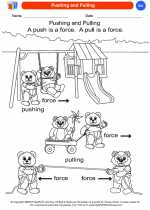Paleontology
Paleontology is the scientific study of prehistoric life through the examination of plant and animal fossils. It helps us understand the history of life on Earth, including the evolution of different species, the ancient environments they lived in, and the processes that shaped the Earth's surface over time.
Key Concepts:
- Fossils: Remains, impressions, or traces of ancient organisms that are preserved in rock.
- Evolution: The process by which species of organisms change over successive generations, often driven by natural selection.
- Geological Time: The vast expanse of time over which Earth's history has unfolded, divided into periods such as the Paleozoic, Mesozoic, and Cenozoic eras.
- Extinction: The disappearance of a species from the Earth, often due to environmental changes or competition with other organisms.
Study Guide:
- What are fossils and why are they important in paleontology?
- Explain the process of fossilization and the different types of fossils.
- Describe the principles of relative and absolute dating in paleontology.
- Discuss the contributions of famous paleontologists such as Mary Anning, Charles Darwin, and Richard Owen.
- Examine the role of paleontology in understanding major extinction events in Earth's history.
- Explain how paleontology contributes to our understanding of ancient climates and environments.
- Discuss the concept of transitional fossils and their significance in evolutionary biology.
- Explore the ethical considerations and controversies in paleontology, such as fossil collection and commercial trade.
◂Science Worksheets and Study Guides Kindergarten. Pushing, Moving, Pulling
Coloring Worksheet How heavy
How heavy  Coloring Worksheet
Coloring Worksheet How heavy
How heavy  Coloring Worksheet
Coloring Worksheet How Things Move
How Things Move  Coloring Worksheet
Coloring Worksheet How Things Move
How Things Move  Coloring Worksheet
Coloring Worksheet Light and Heat
Light and Heat  Coloring Worksheet
Coloring Worksheet Light and Heat
Light and Heat  Coloring Worksheet
Coloring Worksheet Magnets
Magnets  Coloring Worksheet
Coloring Worksheet Magnets
Magnets  Coloring Worksheet
Coloring Worksheet Pushing and Pulling
Pushing and Pulling  Coloring Worksheet
Coloring Worksheet Pushing and Pulling
Pushing and Pulling  Coloring Worksheet
Coloring Worksheet Simple Machines
Simple Machines  Coloring Worksheet
Coloring Worksheet Simple Machines
Simple Machines  Coloring Worksheet
Coloring Worksheet Sink and Float
Sink and Float  Coloring Worksheet
Coloring Worksheet Sink and Float
Sink and Float  Coloring Worksheet
Coloring Worksheet Sound All Around
Sound All Around  Coloring Worksheet
Coloring Worksheet Sound All Around
Sound All Around  Coloring Worksheet
Coloring Worksheet Up and Down
Up and Down  Coloring Worksheet
Coloring Worksheet Up and Down
Up and Down  Coloring Worksheet
Coloring Worksheet Wheels
Wheels  Coloring Worksheet
Coloring Worksheet Wheels
Wheels 

 Coloring Worksheet
Coloring Worksheet
 Coloring Worksheet
Coloring Worksheet
 Coloring Worksheet
Coloring Worksheet
 Coloring Worksheet
Coloring Worksheet
 Coloring Worksheet
Coloring Worksheet
 Coloring Worksheet
Coloring Worksheet
 Coloring Worksheet
Coloring Worksheet
 Coloring Worksheet
Coloring Worksheet
 Coloring Worksheet
Coloring Worksheet
 Coloring Worksheet
Coloring Worksheet
 Coloring Worksheet
Coloring Worksheet
 Coloring Worksheet
Coloring Worksheet
 Coloring Worksheet
Coloring Worksheet
 Coloring Worksheet
Coloring Worksheet
 Coloring Worksheet
Coloring Worksheet
 Coloring Worksheet
Coloring Worksheet
 Coloring Worksheet
Coloring Worksheet
 Coloring Worksheet
Coloring Worksheet
 Coloring Worksheet
Coloring Worksheet
